centre for earth observation science News Archive
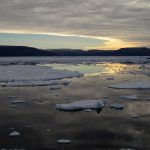
Clayton H. Riddell Faculty of Environment, Earth, and Resources
Arctic open-water periods are projected to lengthen dramatically by 2100, UM study
June 3, 2021 —
A team from the Centre for Earth Observation Science has published a paper in the Nature journal Communications Earth & Environment that addresses a large gap in our understanding of Arctic Sea Ice coverage.
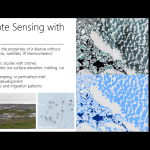
Clayton H. Riddell Faculty of Environment, Earth, and Resources
A new virtual experience for Arctic Science Day
March 23, 2021 —
More than 1,500 students attended the unique Arctic and climate science workshop with in-field subject matter experts with backgrounds in physical and chemical oceanography, sea ice optics, marine mammals, remote sensing, contaminants and oil spills.
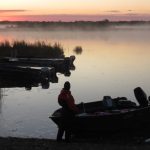
Clayton H. Riddell Faculty of Environment, Earth, and Resources
Water workshop discusses Lake Winnipeg basin and the Nelson River watershed
March 22, 2021 —
The Centre for Earth Observation Science in the Clayton H. Riddell Faculty of Environment, Earth, and Resources hosted a virtual workshop about research programs occurring in the Lake Winnipeg basin and Nelson River watershed
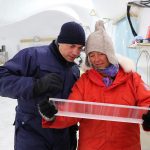
Clayton H. Riddell Faculty of Environment, Earth, and Resources
Scientists stunned to discover fossil plants beneath mile-deep Greenland ice, indicating an ice-free landscape in a warmer climate
March 15, 2021 —
The discovery helps confirm a new and troubling understanding that the Greenland ice has melted off entirely during recent warm periods in Earth’s history—periods like the one we are now contributing to with human-caused climate change.

Clayton H. Riddell Faculty of Environment, Earth, and Resources
Meet Dr. Juliana Marini Marson, Assistant Professor in the Department of Environment and Geography
March 8, 2021 —
Dr. Juliana Marson is a new faculty member at the University of Manitoba whose research focus lies on the polar oceans, their interactions with the cryosphere and climate.

UM prof receives national award for environmental research
February 18, 2021 —
Canada Research Chair honoured by professional chemistry organization
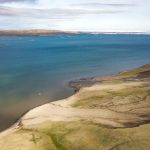
Clayton H. Riddell Faculty of Environment, Earth, and Resources
Thomsen River Estuary, Banks Island: Photo Essay
January 28, 2021 —
NASA and UM team up to show the remote beauty of Northern Canada

Clayton H. Riddell Faculty of Environment, Earth, and Resources
Declining Arctic sea ice drives divergent arctic shrub growth
December 15, 2020 —
Arctic sea ice has been in steep decline over the last two decades. Meanwhile, tundra shrub abundance has been increasing in many regions of the Arctic.
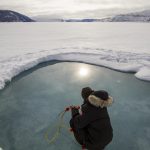
Clayton H. Riddell Faculty of Environment, Earth, and Resources
Synthesis study demonstrates phytoplankton can bloom below Arctic sea ice
November 19, 2020 —
Until roughly a decade ago, most scientists assumed that phytoplankton remained in a sort of stasis throughout the winter and spring until sea ice break-up. Now there is a growing body of evidence that suggests under-ice blooms (UIBs) of phytoplankton can occur in low-light environments below sea ice.

Wpg Free Press: UM researchers racing to protect Arctic from an inevitable oil spill
November 2, 2020 —
With the possibility of an ice-free summer in the Arctic in the near future, understanding how oil behaves in an Arctic ecosystem is critical






